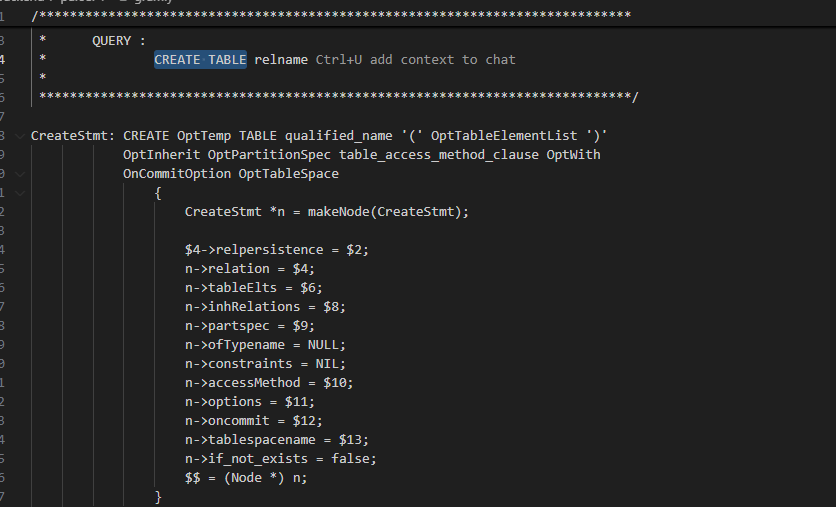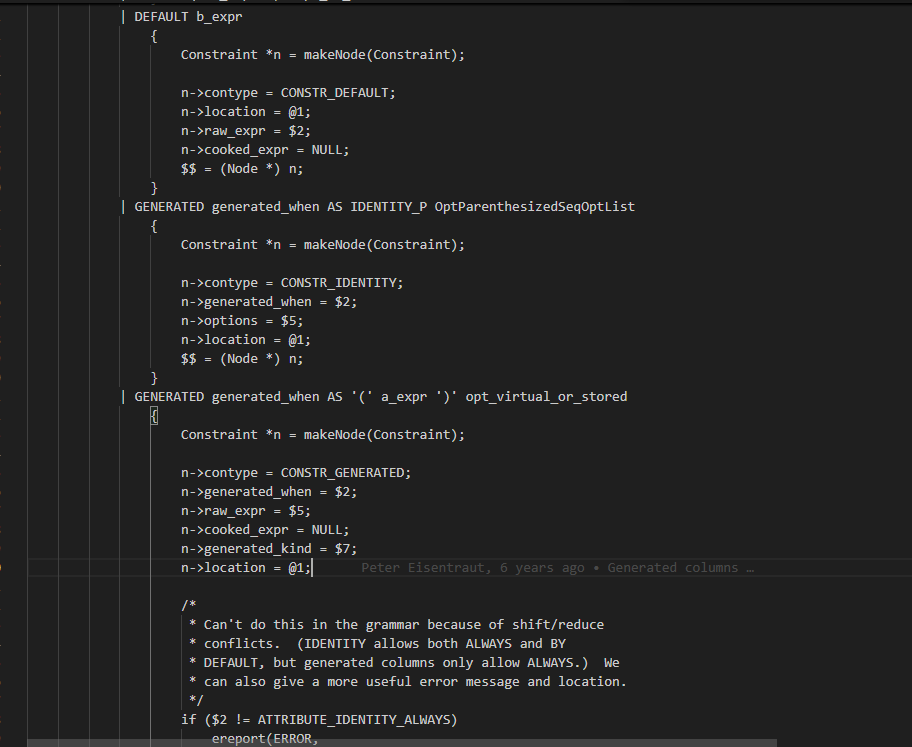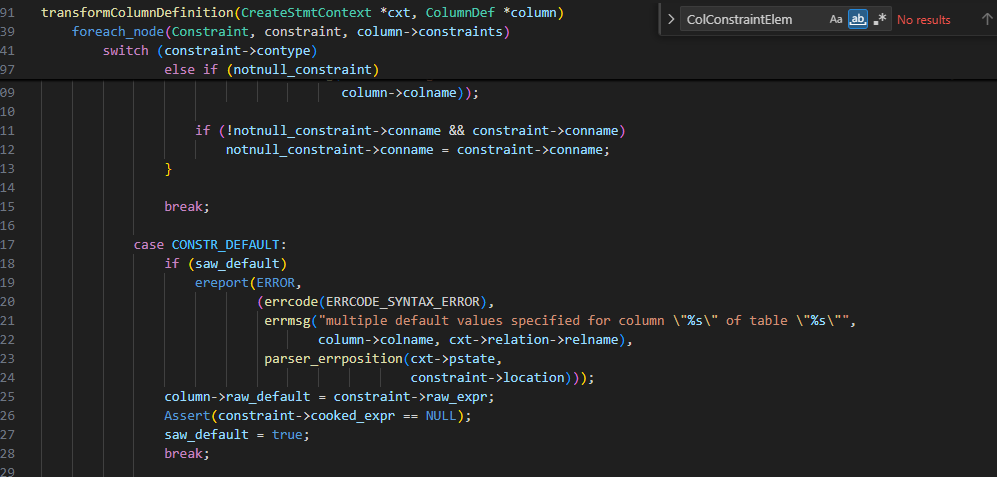语法

OptTableElementList->TableElementList->TypedTableElement->columnDef->ColQualList->ColConstraint->ColConstraintElem
default的语法规则在ColConstraintElem下,解析时会解析为Constraint,contype为CONSTR_DEFAULT 存在ColumnDef->constraints下

DDL创建表
transformCreateStmt
transformColumnDefinition
default语法表达式赋值给raw_default

DefineRelation
AddRelationNewConstraints
make_parsestate
addRangeTableEntryForRelation
addNSItemToQuery
cookDefault
StoreAttrDefault
语义分析对应constraint 并且把表达式结果序列化插入pg_attrdef表中
c
List *
AddRelationNewConstraints(Relation rel,
List *newColDefaults,
List *newConstraints,
bool allow_merge,
bool is_local,
bool is_internal,
const char *queryString)
{
List *cookedConstraints = NIL;
TupleDesc tupleDesc;
TupleConstr *oldconstr;
int numoldchecks;
ParseState *pstate;
ParseNamespaceItem *nsitem;
int numchecks;
List *checknames;
List *nnnames;
Node *expr;
CookedConstraint *cooked;
/*
* Get info about existing constraints.
*/
tupleDesc = RelationGetDescr(rel);
oldconstr = tupleDesc->constr;
if (oldconstr)
numoldchecks = oldconstr->num_check;
else
numoldchecks = 0;
/*
* Create a dummy ParseState and insert the target relation as its sole
* rangetable entry. We need a ParseState for transformExpr.
*/
pstate = make_parsestate(NULL);
pstate->p_sourcetext = queryString;
nsitem = addRangeTableEntryForRelation(pstate,
rel,
AccessShareLock,
NULL,
false,
true);
addNSItemToQuery(pstate, nsitem, true, true, true);
/*
* Process column default expressions.
*/
foreach_ptr(RawColumnDefault, colDef, newColDefaults)
{
Form_pg_attribute atp = TupleDescAttr(rel->rd_att, colDef->attnum - 1);
Oid defOid;
expr = cookDefault(pstate, colDef->raw_default,
atp->atttypid, atp->atttypmod,
NameStr(atp->attname),
atp->attgenerated);
/*
* If the expression is just a NULL constant, we do not bother to make
* an explicit pg_attrdef entry, since the default behavior is
* equivalent. This applies to column defaults, but not for
* generation expressions.
*
* Note a nonobvious property of this test: if the column is of a
* domain type, what we'll get is not a bare null Const but a
* CoerceToDomain expr, so we will not discard the default. This is
* critical because the column default needs to be retained to
* override any default that the domain might have.
*/
if (expr == NULL ||
(!colDef->generated &&
IsA(expr, Const) &&
castNode(Const, expr)->constisnull))
continue;
defOid = StoreAttrDefault(rel, colDef->attnum, expr, is_internal);
cooked = (CookedConstraint *) palloc(sizeof(CookedConstraint));
cooked->contype = CONSTR_DEFAULT;
cooked->conoid = defOid;
cooked->name = NULL;
cooked->attnum = colDef->attnum;
cooked->expr = expr;
cooked->is_enforced = true;
cooked->skip_validation = false;
cooked->is_local = is_local;
cooked->inhcount = is_local ? 0 : 1;
cooked->is_no_inherit = false;
cookedConstraints = lappend(cookedConstraints, cooked);
}
...
/*
* Update the count of constraints in the relation's pg_class tuple. We do
* this even if there was no change, in order to ensure that an SI update
* message is sent out for the pg_class tuple, which will force other
* backends to rebuild their relcache entries for the rel. (This is
* critical if we added defaults but not constraints.)
*/
SetRelationNumChecks(rel, numchecks);
return cookedConstraints;
}插入数据
在重写阶段将表达式赋给对应value
rewriteTargetListIU